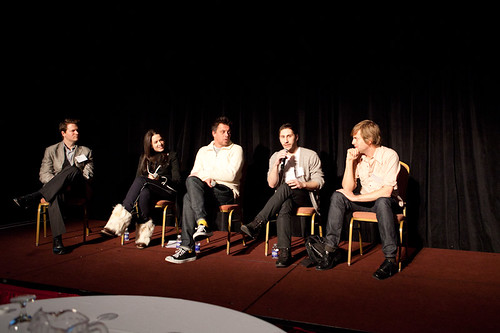Open Road is a digital content company that publishes and markets ebooks by creating connections between authors and their audiences across multiple platforms.
Brendan Cahill, VP and Publisher of Open Road Integrated Media (ORIM), was lead presenter during eBook Summit 2010 last week in NYC. He set the tone for a forward looking agenda in the publishing industry, “pioneering an alternative publishing model”, where digital books replace print books at the epicenter.
Although Open Road (@openroadmedia) is only a year old, they’ve already made a major push in publishing ebooks and have set an ambitious target of 2,000 new books to be published in 2011! They are effectively producing more content per title than traditional print publishers (including HD video author and book trailers) and yet they’ve slashed the standard industry production time line from a year or more among traditional publishers to approximately 120 days at Open Road.
How is this possible? This shrinking book cycle (rights acquisition, manuscript editing, cataloguing, soliciting, fulfillment and marketing) critical to their rapid upscaling and early mover success depends upon a new publishing model: outsource, outstource, outsource. Virtually every stage of the traditional publishing process is outsourced except for acquiring rights and marketing which allows ample flexibility for editing, art directing, etc. Check out the first few slides of Cahill’s presentation below.
Speed to market and scalability is possible at least in part because Open Road is primarily publishing athors’ back list books. Nevertheless, Cahill assured us that the their 2,000 title goal for 2011 does include “e-riginals—original e-books—which he said were a small part of the company’s business, but were critical to its identity.” (Publishers Weekly)
In addition to a new publishing model, Cahill distinguished Open Road’s new book marketing model from the ingrained paradigm employed by traditional publishing companies. The new model integrates content communities, social networks, blogs and microblogs, videos/photos, retail and ratings.
Cahill spoke about how Open Road Media uses the Internet to connect their readers to authors. The digital publisher creates author pages with videos and photos, as well as social media accounts to help build a platform for the write online. “We follow the marketing process to empower the author to connect with readers,” he said.(eBookNewser)
Cahill explained that professionally produced high definition video is “one of the core offerings that we create…” He showed us a slick example of Midnight Guardians, by Jonathan King. The quality of the footage, editing and storytelling is superb! Cahill emphasized the short, enticing, syndicate-able and viral potential of the video content they are using to market their titles.
Affirming and reaffirming Open Road’s new media savvy was the strongest undercurrent to Cahill’s presentation, and it illumnates Open Road’s vision of the emerging publishing industry. Publishing tomorrow, Open Road believes, will focus on a quick and efficient acquisition-to-sales cycles and top notch marketing.
“Metadata is our sales force… We concentrate on marketing.” (Brendan Cahill)
This lean model shifts publishers out of the editing tradition and out of the book factory tradition. It seems considerably more sustainable in today’s marketplace, and it creates partnerships and lucrative synergies with businesses that otherwise might be direct competitors with a traditional publisher. Is this what tomorrow’s publishers will look like?
Kohlberg Ventures financed Open Road, so they must think so. And Open Road was cofounded by former HarperCollins CEO, Jane Friedman, and film producer Jeffrey Sharp, so they must think so. Established novelist Susan Minot thinks so. And so does debut novelist Mary Glickman.
What do you think? Is Open Road’s lean, quick-to-market and social media oriented marketing strategy a road map for tomorrow’s publishing companies?
Like this:
Like Loading...










